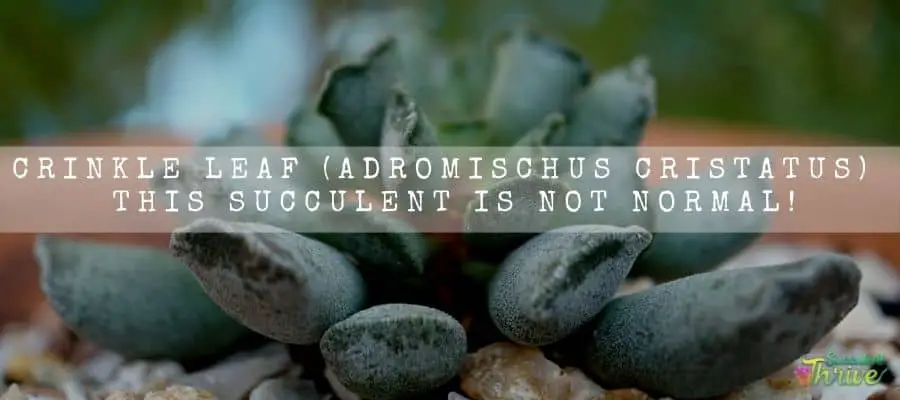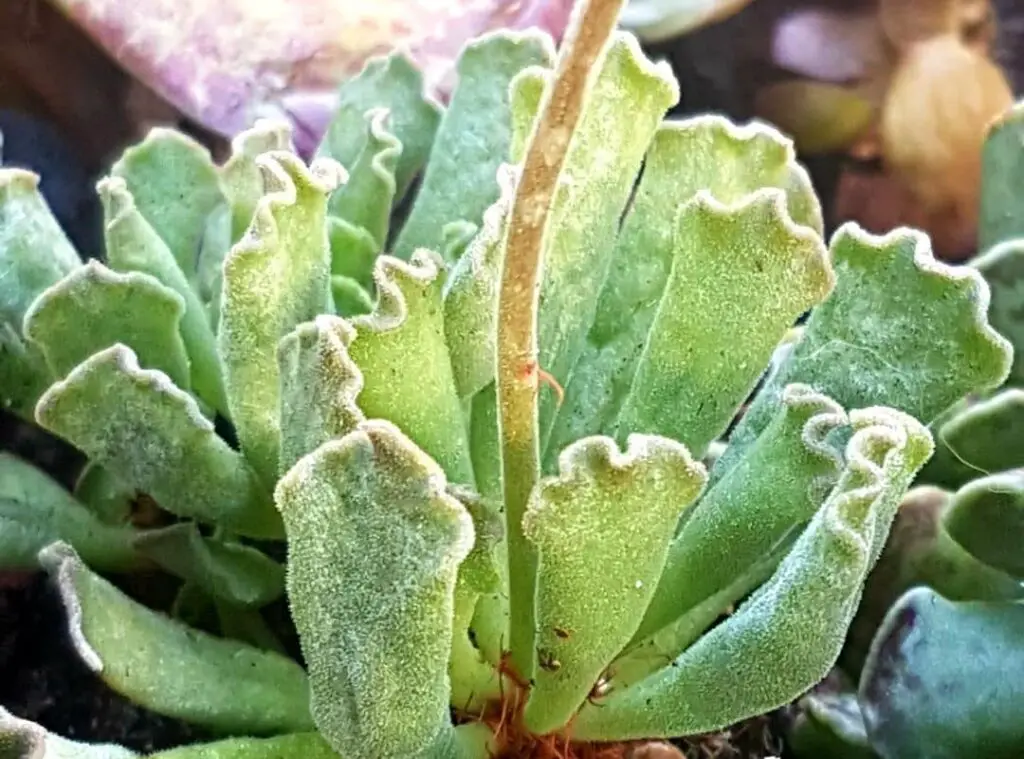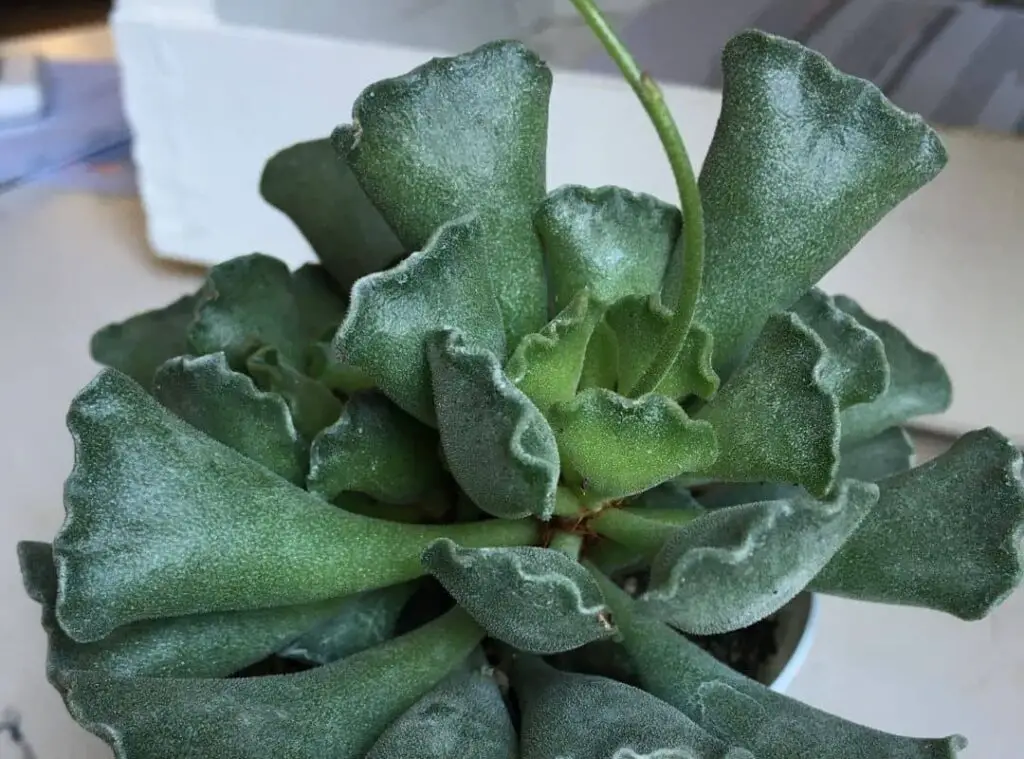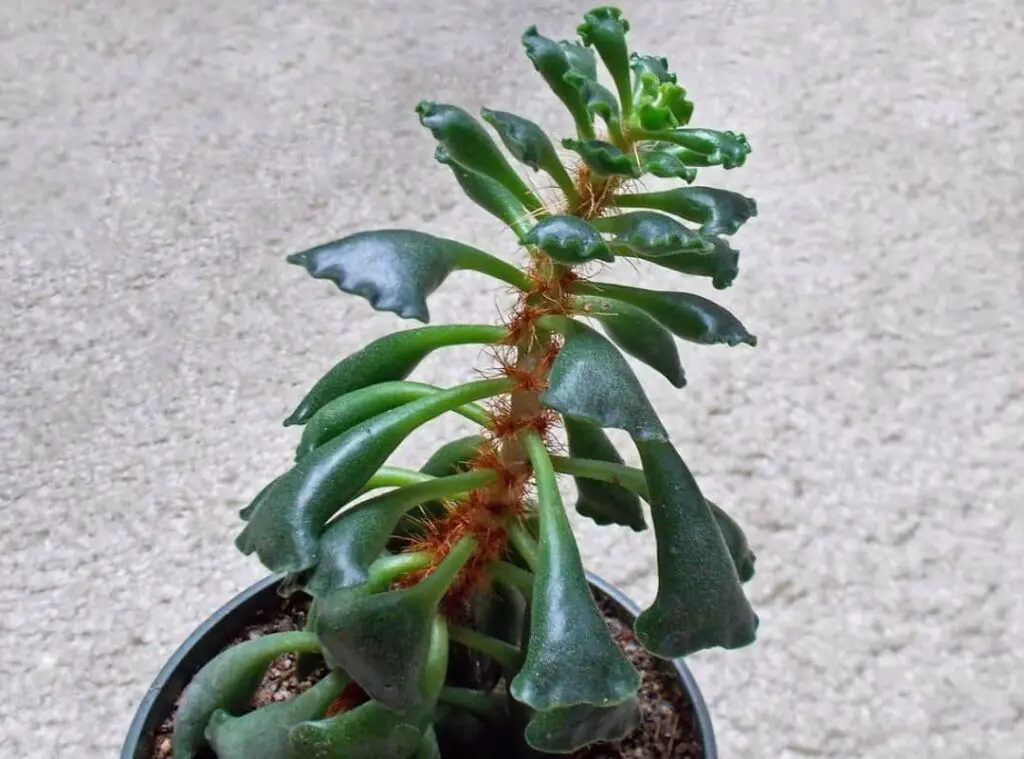If you want to have a new succulent which is unique in its looks, then crinkle leaf plants would be quite handy to fulfill your requirement.
They would be such a graceful addition to your office space or your home. Crinkle leaf plants are also known as key lime pie plants in general.
They are a compact and slow growing set of plants and they are endemic plants to South Africa.
Crinkle leaf plants are called Adromischus cristatus scientifically. If you manage to properly care for them, crinkle leaf plants would perform well and last for too long too.

How do I identify crinkle leaf succulents?
Leaves of the crinkle leaf plants are fleshy and triangular. Besides, you could spot them in gray green colors.
Those leaves will arise in an upward manner from the central base and the leaves will be crinkled at the top.
They have got their common name due to this feature. Moreover, crinkle leaf plant leaves are hairy too. It gives them a fuzzy appearance.
In addition to these features, they produce flowers in reddish white colors. crinkle leaf plants flowers are tubular shaped. You could spot them flowering in spring or in early summer.
Size of the plant
Crinkle leaf plants would grow up to 18 inches ( 45cm) in height and their maximum width would be 24 inches ( 61 cm) when they grow to their full potential.
Growth rate
Crinkle leaf plants are slow growers.
One Look Care Guide
| Botanical Name | Adromischus cristatus |
| Common Name | Key lime pie plants |
| Plant Type | Succulent |
| Mature Size | 18 inches ( 45cm) height 24 inches ( 61 cm) width |
| Sun Exposure | Full sunlight to semi shade |
| Soil Type | Well-draining |
| Soil pH | pH of 6.1–7.8 |
| Bloom Time | Spring or in early summer |
| Flower Color | Reddish white |
| Hardiness Zones | USDA zones is Zone 9a (Minimum 20° F | -6.7° C) |
| Native Area | South Africa |
| Toxicity | Toxic |
| Average price | $ 8 |
How do you take care of crinkle leaf succulents?
Light Requirement
Crinkle leaf plants can withstand semi shade. However, they are fond of growing in full sunlight. Literally they will perform well if they can gain full sunlight for six hours in the morning.
When the weather is too harsh and intense, grow them while exposing them to semi shade.
Hence, I recommend you book them closer to a bright sunny window. If they still lack adequate sunlight, you can grow them closer to grow lights.

Temperature and humidity
Crinkle leaf plants prefer to grow in warmer temperatures just like the rest of the other succulents.
This literally means they would thrive well in warmer and dry weather. They can perform well in room temperatures and in room humidity levels.
A temperature level above 50 degrees Fahrenheit would suit them the best. However, they can tolerate temperatures up to 20 degrees Fahrenheit also.
The exposure to frost for extended periods would badly impact them. Chances are that it could even be fatal on the plants too.
When you grow them indoors, ensure that you are not placing your plants closer to cold drafts as the drastic changes in the temperatures could be unhealthy for them.
Is it cold hardy?
Crinkle leaf plants are not cold hardy plants.
USDA Hardiness Zone
Crinkle leaf plants ‘ preferred USDA zones is Zone 9a (Minimum 20° F | -6.7° C)
Watering Requirement
A minimum water level would be sufficient for the survival of the Crinkle leaf plants. If you end up over watering them, chances are that it could even be lethal on them.
Excessive water will create rots in the plants. Hence, it is critical that you check whether their soil is dry and then water. That will ensure that there will be no over watering.
Once every two weeks would be enough during spring to fall. You could cut back on watering during winter and ensure that you do it infrequently to keep them moist only.
That will keep their leaves plump. Keep in mind that under watering will have less repercussions than over watering.
You can easily revive an under-watered plant rather than reviving an overwatered plant.
Soil Requirement Type / pH
Crinkle leaf plant growth would be benefitted from a well-draining soil mix. Hence, a loose sandy soil would be ideal for this purpose.
Best would be to use a readily available succulent soil mix or cactus soil mix to grow them. If you use a regular potting medium , the density would be high. A pH of 6.1–7.8 would suit these plants the best.
Pot size Potting and Repotting
It is mandatory that you select a pot which has sufficient draining holes to grow the Crinkle leaf plants. An unglazed pot would be the most appropriate pot type to use for them.
The reason to use those pot materials is that their water evaporation is faster compared to other materials.
In terms of repotting the Crinkle leaf plants, you do not have to do it quite often. They prefer to stay cramped in the planters.
When you spot the roots, and the leaves are coming out from the pot you could consider repotting them into a new pot.
All you have to do is to remove the plant from the older pot and grow them in a new pot. However, prior to that ,make sure that you check whether there are any rotten parts in the plant.
If you find any , you can remove them and treat it with fungicide. Next when you plant them, you should plant them in the same depth that they were planted before.

Where to Plant
Crinkle leaf plants are not cold hardy plants. Hence if you are someone who constantly faces much colder weather conditions, grow them as indoor plants.
Alternatively, grow them as outdoor plants during summer and bring them indoors when the weather conditions get unhealthy .
Fertilizer and time of year
You may feed the Crinkle leaf plants once every month during spring and summer
I encourage you to use a liquid fertilizer which is specially made for cactus and for succulents. Never apply fertilizers for them during winter and fall.
Can be toxic to pets
Crinkle leaf plants are toxic plants for pets as well as for humans. Hence ensure that your pets or the kids cannot reach them.
Common bugs and illnesses
Crinkle leaf plants generally resist diseases and pests attacks. However, the diseases caused by over watering could be troublesome for these plants.
For example, you may come across root rot which could even kill your plants if it is spread on a severe level. Besides, there are pests such as mealybugs, aphids which could invade them too.

How to propagate crinkle leaf succulent
There are two main propagation methods of Crinkle leaf plants, they are leaf propagation method and the seeds propagation method.
However, the commonly used method is the leaves propagation method rather than the seeds propagation method.
You cannot guarantee the successful result of the seeds propagation method , and it is somewhat difficult to do too.
How to conduct the leaf propagation of the Crinkle leaf plants
To start off, twist a leaf from the stem. When you twist the leaf , ensure that you are obtaining the whole leaf as it will consequently assure the successful results of the propagation.
Alternatively, you could collect a dropped healthy leaf also for this process. Next, allow the cuttings to develop calluses and then plant them in a well-draining soil mix.
How to propagate the Crinkle leaf plants by using the seeds
You only have to sow the seeds in a well-draining potting mix whilst exposing them to warmer temperature levels.
However it will be time consuming though since it will take a longer period to show the results.
Conclusion
Crinkle leaf plants are such great plants to have in your indoor garden collection or even in your outdoor garden collection.
All you need to ensure is that you look after them well so that they can grow to their best. Happy cultivating with Crinkle leaf plants !
Read Next : Epiphyllum Oxypetalum | A Majestic Queen In the Cactus World |
